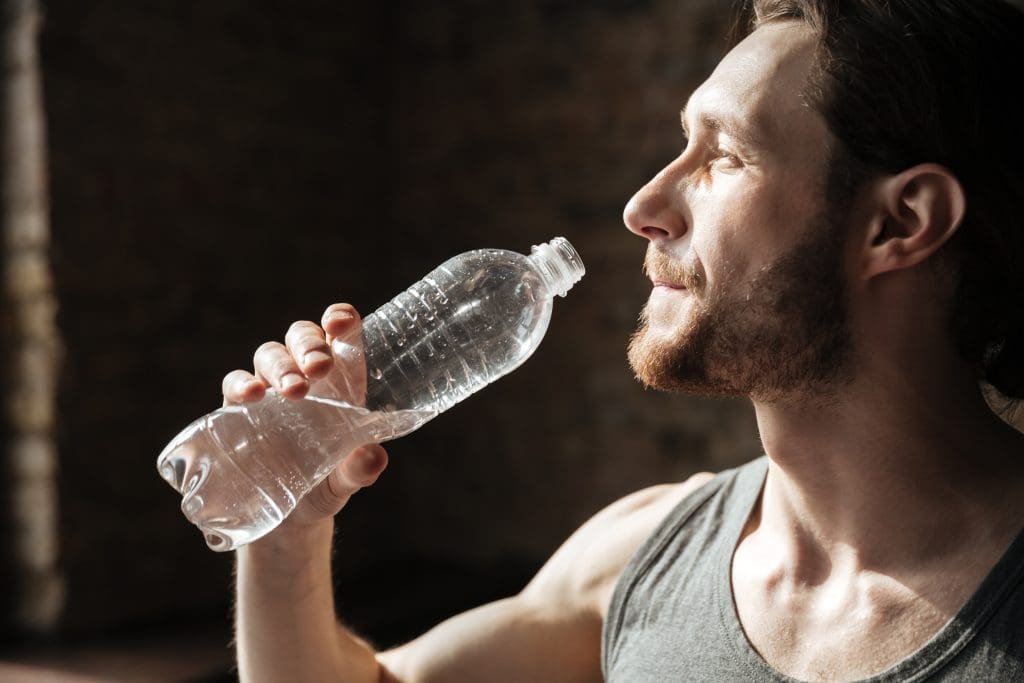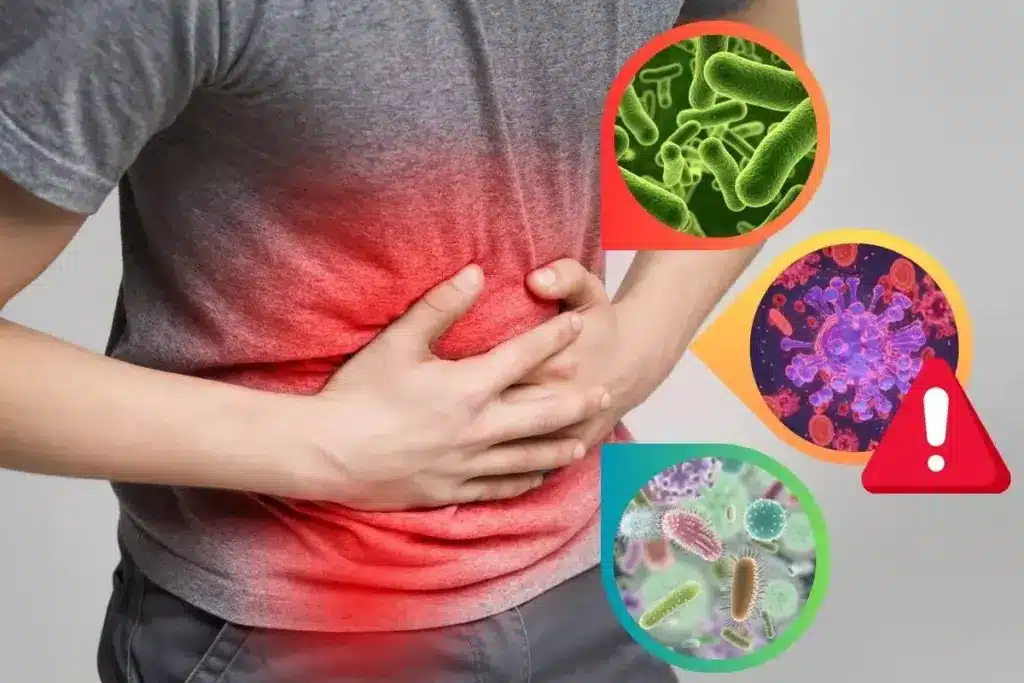Is drinking a lot of water good for your colon? Drinking enough water is key for a healthy digestive system. We often forget how important hydration is for colon health. Drinking water helps prevent constipation by making stool softer and encouraging regular bowel movements.
Also, staying hydrated helps the digestive system stay healthy. This might even lower the chance of colon cancer. As we look into hydration colon health, it’s clear that drinking enough water is vital for avoiding many colon problems.
Key Takeaways
- Drinking enough water helps prevent constipation.
- Adequate hydration supports overall digestive health.
- Proper hydration may reduce the risk of colon cancer.
- Water intake is key for a healthy colon.
- A hydrated body supports the digestive system’s overall well-being.

The Vital Connection Between Water and Your Digestive System
Water is key for our digestive system. It helps break down food and absorb nutrients. This is vital for a healthy digestive tract and meeting our nutritional needs.
The digestive system is complex, with both mechanical and chemical steps. Water is essential for these steps. It helps dissolve nutrients and minerals, making them easier for our body to use.
How Water Moves Through Your Digestive Tract
Water starts its journey in the mouth, mixing with saliva that breaks down food. When food moves to the stomach, water helps liquefy it. This makes it easier for stomach acids and enzymes to break it down further.
In the small intestine, water is vital for nutrient absorption. The walls of the small intestine have villi, which increase the surface area for absorption. Water dissolves nutrients, helping them get into the bloodstream more effectively.
The Role of Water in Nutrient Absorption
Nutrient absorption is a key function of the digestive system, and water is essential. It helps dissolve nutrients, allowing the body to absorb the necessary building blocks for energy, growth, and repair.
Water also helps prevent constipation by softening stool and promoting regular bowel movements. This reduces the risk of certain gastrointestinal disorders and keeps the digestive system healthy.
In summary, water is vital for our digestive system’s proper functioning. It aids in breaking down and absorbing nutrients, supports the digestive tract’s health, and prevents constipation. Drinking enough water is a simple yet effective way to support our digestive health.
Understanding Your Colon’s Function and Hydration Needs
The colon, or large intestine, is key to our digestive system. It absorbs water and electrolytes from waste, making it less liquid. This helps our body get rid of waste properly.
Anatomy of the Colon
The colon is about 5 feet long and has different parts. These include the cecum, ascending colon, transverse colon, descending colon, and sigmoid colon. Each part helps process waste.
The colon’s walls have a mucous membrane. This helps stool move smoothly. The colon’s muscles also move waste towards the rectum, a process called peristalsis.
How the Colon Uses Water
The colon absorbs water and electrolytes from waste. This makes waste more concentrated. Drinking enough water helps the colon work well.
Water supports the gut lining by keeping it moist. This helps stool move easily. Without enough water, stool can become hard and dry, leading to constipation.
Knowing how the colon uses water shows why staying hydrated is important. It helps the colon work right and get rid of waste efficiently.
Water and Colon Health: The Essential Relationship
Water is key for colon health. It affects the colon’s tissue and the balance of gut bacteria. Drinking enough water helps the colon work right, keeping the digestive system healthy.
How Hydration Affects Colon Tissue
Drinking enough water is important for the colon’s health. It keeps the colon’s lining moist, avoiding inflammation. A hydrated colon absorbs water and salts better.
Key benefits of hydration for colon tissue include:
- Maintaining the integrity of the colon lining
- Preventing inflammation and irritation
- Supporting the absorption of water and electrolytes
Water’s Role in Maintaining Intestinal Flora
Water is also vital for the balance of gut bacteria. Drinking enough water helps good bacteria grow in the colon. This is key for a healthy digestive system.
| Aspect of Colon Health | Impact of Hydration |
| Colon Tissue Integrity | Water keeps mucous membranes healthy, preventing inflammation |
| Intestinal Flora Balance | Adequate hydration supports the growth of beneficial bacteria |
| Colon Function | Proper hydration enables effective absorption of water and electrolytes |
In conclusion, water and colon health are closely linked. Water affects the colon’s tissue and gut bacteria balance. Drinking enough water supports colon health and overall well-being.
How Proper Hydration Prevents Constipation
Drinking enough water helps prevent constipation by making bowel movements smoother. It softens the stool, making it easier to move through the digestive system.
Water is key for a healthy digestive system. It helps dissolve nutrients and minerals, making them easier for the body to use. It also softens stool and helps with regular bowel movements.
The Mechanics of Water in Stool Formation
Water is vital in making stool. When we eat, water breaks down nutrients. The waste then goes to the colon. In the colon, water is absorbed, and the waste becomes stool.
Drinking enough water keeps stool the right consistency. This makes it easier to pass and lowers constipation risk. Soft, bulky stool is easier on the digestive system, leading to regular bowel movements.
Studies on Hydration and Bowel Movement Frequency
Many studies have looked at how hydration affects bowel movements. They found that drinking more water leads to more regular bowel movements and less constipation.
A study in a medical journal showed that more water intake means less constipation. It found that water helps soften stool and improves its movement through the digestive system.
In conclusion, staying hydrated is key to avoiding constipation. Drinking enough water helps keep bowel movements regular and reduces digestive problems.
Dehydration and Its Impact on Colon Function
Dehydration affects the colon’s ability to work right. It can cause constipation, inflammation, and even more serious problems over time.
It’s important to know the signs of colon dehydration to keep your colon healthy. Some key indicators include:
- Infrequent bowel movements or constipation
- Hard or lumpy stools
- Abdominal pain or cramping
- Dark or concentrated urine
Warning Signs of Colon Dehydration
Spotting these signs early can help prevent bigger problems. As Dr. [Last Name] says, “Even mild dehydration can cause a lot of discomfort and harm the colon.” It’s key to tackle dehydration quickly to avoid serious issues.
Common symptoms of colon dehydration include:
“Dehydration makes the colon take more water from the stool, causing constipation and possibly harming the colon’s lining.” –
, Gastroenterologist
Long-term Effects of Chronic Dehydration on the Colon
Chronic dehydration can seriously harm the colon over time. It may raise the risk of colon cancer and other diseases. Long-term dehydration can lead to:
- Chronic constipation, which might cause hemorrhoids or diverticulitis
- Higher risk of colon cancer from long-term toxin exposure
- Damage to the colon’s lining, making it hard to absorb water and electrolytes
Keeping well-hydrated is key for colon health and avoiding dehydration problems. As we’ve seen, water is vital for the colon. Drinking enough water is a simple yet powerful way to keep your digestive system healthy.
Water Intake and Toxin Removal from the Colon
Water is key in removing toxins from the colon. It’s vital for our digestive system’s health. Let’s see how water helps keep our colon healthy.
How Water Helps Flush Waste Products
Water helps dissolve nutrients and minerals, making them easier for our body to use. It also softens stool, preventing constipation. Without enough water, our colon can get dehydrated, making it harder to pass stools.
The process of waste removal in the colon involves several key steps:
- Water dissolves waste products, making them easier to get rid of.
- Drinking enough water keeps the mucus layer in the colon healthy, protecting it.
- Water helps move waste through the colon with peristalsis, the muscle contractions.
To show how important water is for colon health, let’s compare hydration levels and their effects.
| Hydration Level | Effect on Colon | Potential Health Impact |
| Adequate Hydration | Softens stool, promotes regular bowel movements | Reduces risk of constipation, diverticulitis |
| Inadequate Hydration | Hardens stool, slows bowel movements | Increases risk of constipation, hemorrhoids |
Debunking Myths About “Colon Cleansing”
The idea of “colon cleansing” is popular, but it’s filled with myths. A healthy colon is important, but some cleansing methods can harm more than help.
Some common myths about colon cleansing include:
- The belief that the colon needs to be “cleansed” regularly to remove toxins.
- The idea that colon cleansing can lead to significant weight loss.
- The notion that colon cleansing is necessary for maintaining good health.
In truth, the colon cleanses itself. Drinking enough water and eating a balanced diet with plenty of fiber is enough. Instead of trying unproven cleansing methods, focus on a healthy lifestyle.
The Connection Between Hydration and Colon Cancer Risk
Drinking enough water may help prevent colon cancer, studies show. Keeping the colon healthy is key. It helps remove toxins and waste.
Research on Water Consumption and Cancer Prevention
Many studies have looked into water and colon cancer. They found that drinking more water might lower colon cancer risk. The exact reasons are being studied, but water seems to help remove harmful substances.
Key findings from recent research include:
- High water intake can lower colon cancer risk.
- Water keeps the colon lining healthy and prevents constipation.
- It may help clear harmful substances from the colon.
How Hydration Supports Cellular Health in the Colon
Hydration is vital for the colon’s health. Water keeps the gut lining strong and helps cells work right. It aids in absorbing nutrients and removing waste, reducing damage and cancer risk.
Hydration is very important for colon health. Drinking enough water supports the colon’s functions. It’s a simple way to boost health and reduce cancer risk.
Water’s Role in Preventing Diverticulosis and Diverticulitis
Drinking enough water is key to keeping the colon walls strong. This is vital for preventing diverticular disease. Diverticulosis and diverticulitis are conditions where small pouches form in the colon wall. Low dietary fiber and not enough water are big risk factors.
Not drinking enough water makes it hard for the colon to move waste. This can cause constipation, which puts more pressure on the colon. Over time, this pressure can lead to the formation of diverticula, mainly in weak spots of the colon wall.
Colon Wall Integrity and Hydration
Hydration is essential for a healthy colon wall. Water softens stool and helps with regular bowel movements. This reduces the strain on the colon wall. A well-hydrated colon can move waste better, lowering the risk of diverticula.
Studies show that drinking more water can lower the risk of diverticular disease. A hydrated colon can handle digestion better. This reduces the risk of complications like diverticulitis.
Case Studies on Water Intake and Diverticular Disease
Many studies have looked at water intake and diverticular disease. One study found that drinking over 2 liters a day lowers the risk of diverticulitis. Those drinking less than 1 liter a day had a higher risk.
Another study showed that more water intake helps prevent diverticulosis from coming back. Patients who drank more water were less likely to have a recurrence. This shows water’s role in preventing these conditions.
These studies stress the need for enough water to keep the colon healthy. Drinking enough water can help prevent diverticular disease. It’s a simple step to take for better colon health.
Hydration and Hemorrhoid Prevention
Drinking enough water is key for good digestive health and preventing hemorrhoids. Hemorrhoids are swollen veins in the lower rectum or anus. They can hurt and make you uncomfortable, often from straining, constipation, or diarrhea.
We’ll look at how staying hydrated helps prevent hemorrhoids. We’ll see how dehydration can lead to hemorrhoids and how drinking enough water can help avoid this.
The Link Between Dehydration and Hemorrhoid Development
Not drinking enough water can raise your risk of getting hemorrhoids. Without enough water, you might get constipated. This is because your colon takes more water from your stool to stay hydrated.
This makes your stool hard and dry, making it hard to pass. Straining to go can put too much pressure on veins in your rectum and anus. This can cause them to swell and turn into hemorrhoids. Drinking enough water helps prevent constipation by making stool softer and easier to pass, which reduces strain on these veins.
“Adequate fluid intake is key to preventing constipation, a big risk for hemorrhoids.”
Source: Expert Opinion on Gastroenterology & Hepatology
How Water Softens Stool to Reduce Strain
Water is important for keeping stool the right consistency. Drinking enough water keeps your stool soft. Soft stools are easier to pass, so you don’t have to strain as much.
| Hydration Level | Stool Consistency | Risk of Hemorrhoids |
| Adequate | Soft | Low |
| Inadequate | Hard | High |
By drinking enough water, you can lower your risk of getting hemorrhoids. It’s not just about how much water you drink. It’s also about staying hydrated all day.
The Synergistic Relationship Between Water and Dietary Fiber
It’s important to know how water and fiber work together for a healthy colon. Fiber helps keep our digestive system in check. But, it works best when we drink enough water.
Why Fiber Needs Water to Work Effectively
Fiber absorbs water, turning into a gel that softens stool. This helps us go to the bathroom regularly. Without enough water, fiber can cause constipation or even blockages.
The mechanism by which fiber works involves:
- Absorbing water to soften stool
- Promoting the growth of beneficial gut bacteria
- Aiding in the removal of waste products from the colon
Optimal Water Intake When Increasing Fiber Consumption
When we eat more fiber, we need to drink more water too. Aim for 8-10 glasses of water a day. But, how much you need can change based on your age, sex, and how active you are.
| Fiber Intake | Recommended Water Intake | Benefits |
| Low (less than 20g/day) | 6-8 glasses/day | Limited digestive benefits |
| Moderate (20-30g/day) | 8-10 glasses/day | Regular bowel movements, some relief from constipation |
| High (more than 30g/day) | 10+ glasses/day | Optimal digestive health, significant relief from constipation |
Knowing how water and fiber work together helps us make better choices for our colon health. This supports our overall well-being.
Recommended Daily Water Intake for Optimal Colon Health
To keep your colon healthy, knowing how much water to drink is key. Drinking enough water is vital for your digestive system, including your colon.
Water helps prevent constipation by making stool softer and encouraging regular bowel movements. It also aids in nutrient absorption and toxin removal.
General Guidelines for Water Consumption
There’s no single rule for how much water to drink each day. Adults are often advised to drink at least eight 8-ounce glasses, known as the “8×8 rule.” But, this can vary for everyone.
The National Academies of Sciences, Engineering, and Medicine suggest men drink about 3.7 liters (125 ounces) daily. Women should aim for 2.7 liters (91 ounces). These amounts include water from all sources, not just plain water.
Adjusting Intake Based on Individual Factors
It’s important to adjust your water intake based on your own needs. This includes your age, sex, weight, activity level, and where you live. For example, athletes or those in hot climates may need more water.
- Activity Level: If you’re active, you’ll lose more water through sweat, so you’ll need more to drink.
- Climate: In hot or humid weather, you lose more water, so you’ll need to drink more.
- Pregnancy and Breastfeeding: Women in these situations may need to drink more water.
- Certain Medical Conditions: Some health issues, like diabetes or heart disease, may require you to drink more or less water.
By considering these factors and adjusting your water intake, you can support your colon health and overall health better.
Signs Your Colon Needs More Hydration
It’s important to know when your colon needs more water. Not enough water can cause health problems, from mild to serious. We’ll look at signs your colon needs more water, including physical symptoms and changes in bowel habits.
Physical Symptoms of Colon Dehydration
Dehydration in the colon shows in several ways. One common sign is constipation. This happens when the body takes water from the colon for other needs, making stools hard and dry. People may also feel abdominal pain or cramping as the colon works harder to move stool.
Bloating and gas can also happen. This is because the digestive system can’t process food well. Dehydration can make you feel fatigued and generally unwell, affecting your body’s health.
Changes in Bowel Habits That Indicate Insufficient Water Intake
Changes in bowel habits are key signs of colon dehydration. Not enough water can cause irregular bowel movements, like constipation or diarrhea. Stools may be hard to pass or have mucus or blood, showing irritation or inflammation.
People might notice their bowel movements change. Some might go less often, while others might have to strain. Watching these changes can help you understand your colon’s hydration and health.
Beyond Plain Water: Other Hydrating Options for Colon Health
Drinking plain water is key for staying hydrated. But, adding other hydrating foods and drinks to your diet can also boost colon health. A good hydration plan includes not just water, but also foods and drinks that help your body stay hydrated and support your colon.
Hydrating Foods That Support Colon Function
Eating hydrating foods can help your colon health. These foods are full of water and nutrients. Here are some examples:
- Cucumbers: They are about 96% water, making them very hydrating.
- Watermelon: With 92% water, it’s both refreshing and hydrating.
- Leafy Greens: Foods like lettuce and spinach are full of water and fiber, helping with bowel movements.
- Tomatoes: They are 95% water, making them a great choice for salads and meals.
- Zucchini: This summer squash is 95% water, adding hydration to many dishes.
Beverages That Help or Harm Colon Hydration
Not all drinks are good for your colon. Some help, while others can harm.
Drinks that help include:
- Herbal Teas: Teas like peppermint and chamomile can aid digestion and keep you hydrated.
- Low-Sugar Juices: Juices from cucumbers or watermelon can be hydrating and good for your colon.
- Coconut Water: It’s a natural source of electrolytes, helping keep you hydrated.
But, some drinks can harm your colon hydration, such as:
- Sugary Drinks: Drinks with lots of sugar can upset your gut bacteria and cause dehydration.
- Caffeinated Beverages: Too much caffeine can lead to dehydration.
- Alcohol: It can dehydrate you and harm your colon if you drink too much.
By choosing wisely, you can support your colon health through hydration.
Practical Tips for Increasing Your Daily Water Intake
Staying hydrated is key, and we’re here to help. We’ll share tips to drink more water. It’s tough to increase your water intake, but with the right methods, you can make it a habit.
Creating Hydration Habits That Stick
Consistent hydration habits are essential. Here are some effective strategies:
- Start your day with a glass of water before brushing your teeth.
- Keep a refillable water bottle with you at all times.
- Make it a habit to drink water before each meal.
- Infuse your water with fruits or herbs for a refreshing taste.
By adding these habits to your daily routine, you’ll find it easier to meet your water intake recommendations.
Technology and Tools to Track Water Consumption
In today’s digital age, there are many tools and apps to track your water. They can be very helpful in keeping your hydration habits:
- Download a water tracking app on your smartphone.
- Set reminders to drink water at specific times of the day.
- Use a smart water bottle that tracks your intake.
Tracking your water consumption helps you stay hydrated. It also gives insights into your drinking habits, helping you make changes.
By using these strategies”creating lasting hydration habits and tracking your intake”you can ensure you drink enough water. This supports your overall health and well-being.
Special Considerations: Water Intake for Different Health Conditions
For people with specific gut issues, drinking enough water is key. It helps manage symptoms and keeps the colon healthy. Conditions like Irritable Bowel Syndrome (IBS) and Inflammatory Bowel Disease (IBD) need special attention to hydration. We’ll look at how much water these conditions require and why adjusting intake after surgery is important.
Hydration Needs for Those with IBS and IBD
Those with IBS and IBD face unique hydration challenges. IBS patients might have unpredictable bowel movements, made worse by not drinking enough water. IBD patients, including those with Crohn’s disease and ulcerative colitis, may struggle to absorb nutrients, making hydration even more critical.
Studies show that drinking enough water can help with IBS and IBD symptoms. Drinking enough water can make stool softer, prevent constipation, and ease discomfort. It’s vital for those with these conditions to keep an eye on their water intake.
Water Intake After Colon Surgery or Treatment
After colon surgery or treatment, patients need to change their water habits. Drinking enough water is essential for healing. It keeps tissues hydrated, helps remove waste, and supports colon health.
Patients should follow their doctor’s advice on water intake after surgery or treatment. It’s usually recommended to drink more fluids to replace lost water and aid in healing.
Conclusion: Embracing Hydration for Lifelong Colon Health
Drinking enough water is key for a healthy colon. It helps us stay healthy from the inside out. By drinking water, we support our digestive system.
Water helps our colon work right and keeps us regular. It also lowers the chance of colon problems. Drinking water is good for our colon’s health.
We can keep our colon healthy by drinking enough water. We should also eat foods that help us stay hydrated. And, we should avoid drinks that can harm our colon.
By focusing on hydration, we can have a better digestive system. This helps us avoid colon issues. Drinking water is a big step towards a healthy colon and body.
FAQ
How does water impact colon health?
Water is key for colon health. It prevents constipation and lowers colon cancer risk. It also keeps the digestive system healthy. Drinking enough water softens stool and helps with regular bowel movements.
What is the connection between water intake and bowel movements?
Drinking enough water stops constipation. It makes stool soft and helps with regular bowel movements. Not drinking enough can make stool hard and cause constipation.
How does dehydration affect the colon?
Dehydration makes stool hard and dry, leading to constipation. It can also damage the colon over time. This increases the risk of colon cancer and other digestive problems.
Can drinking water help prevent colon cancer?
Yes, drinking enough water may lower colon cancer risk. It supports colon cell health and helps remove toxins.
How much water should I drink for optimal colon health?
Daily water needs vary by age, sex, and activity level. Drinking at least eight glasses a day is a good start. Adjust based on your needs.
Are there other hydrating options beside plain water?
Yes, hydrating foods like fruits and veggies are good. Herbal teas and low-sugar sports drinks also help. But avoid sugary and caffeinated drinks that can harm colon hydration.
How can I increase my daily water intake?
To drink more water, set reminders and use apps. Add hydrating foods to your diet. Make water more appealing by infusing it with fruits or herbs.
Do I need to adjust my water intake if I have a digestive condition?
Yes, people with IBS or IBD may need to adjust their water intake. Talk to a healthcare professional to find the right hydration plan for you.
Can water help prevent diverticulosis and diverticulitis?
Yes, enough water may prevent diverticulosis and diverticulitis. It keeps the colon wall strong and helps remove waste. A high-fiber diet and enough water are key.
How does water intake impact hemorrhoid prevention?
Drinking enough water can prevent hemorrhoids. It softens stool and reduces strain on the rectal veins. Adequate hydration is vital for healthy bowel habits and preventing constipation.










